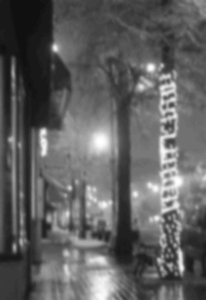Film Noir: Getting Started

As a film buff, I like a lot of different types of movies, but film noir is a genre I particularly enjoy. I find a lot of people are familiar with the term, having seen it in a review or movie description, but don't really understand what puts a film in this category. You'll find various attempts to answer this question, but here are some of the generally accepted characteristics of the genre. (Many books have been written on the subject, so this is obviously just a brief overview of all that could be talked about.)
The term itself was coined by a French cinephile named Nino Frank in 1946. Noir source material often came out of the hard-boiled novels of writers like Raymond Chandler, Dashiell Hammett and others. Around the time of World War 2, American cinema took a definite term towards darker themes and moods. Certainly the horrors of war may have had something to do with this. Also, many German directors (Billy Wilder, Fritz Lang, etc.) made their escape from Nazi Germany around this time and brought various influences, especially German Expressionism, to Hollywood. Hitchcock, a personal favorite of mine, also worked in Berlin during his early career and picked up some of these same influences.
German Expressionism is characterized by an emphasis on extreme contrast between light and shadow (also called chiaroscuro), as well as creative camera angles not in use in early hollywood film making. some of these techniques were already in use in silent film as well. often sparse lighting was used to disguise the cheap or limited sets available. Citizen Kane, which is arguably not a film noir, is considered a masterpiece partly because of its influence in lighting and camera work. Sometimes it is hard to realize today in our world of quick-cuts and steadicam work how revolutionary this seemed at the time.
A number of common movie themes first gained popularity in noir, including the "femme fetale", man on the run (often wrongly accused), the big score gone wrong, double and triple twisting plots, the gangster trying to go clean, use of flashbacks and memory devices (including amnesia), the lone-wolf detective, etc. Even today many commonly used movie themes owe a debt to noir, if not ripping it off entirely or updating it to modern themes. Psychology also began to play a big part in later noirs and Hitchcock continued to use this theme throughout his work (almost all of which contained elements of noir even through later films like Psycho or Frenzy).
If you are someone who still buys DVDs, you can click the image for a link to Amazon. I've seen most if not all of these. I'm always open for recommendations, as there are still some highly rated noirs I haven't seen.
































